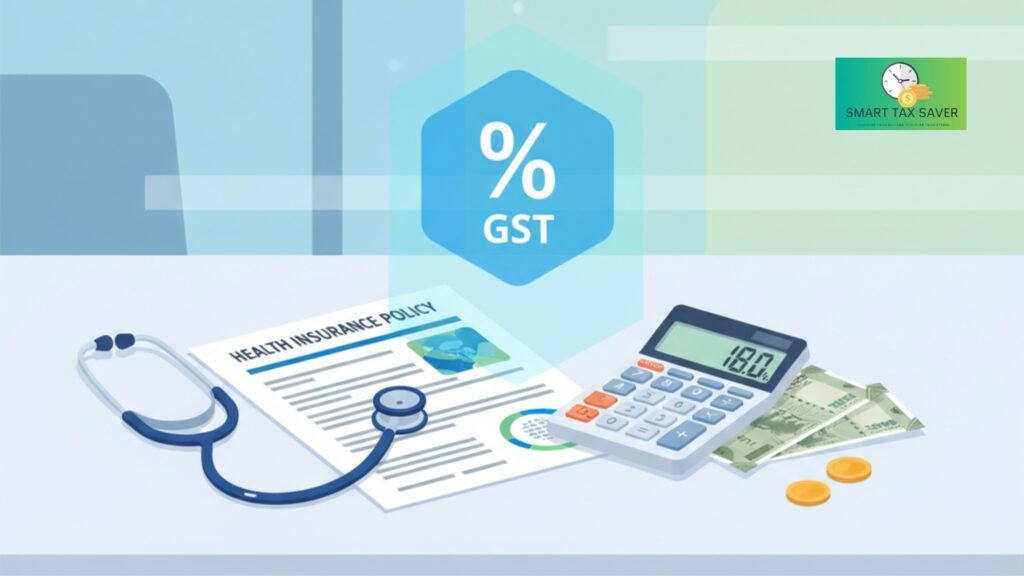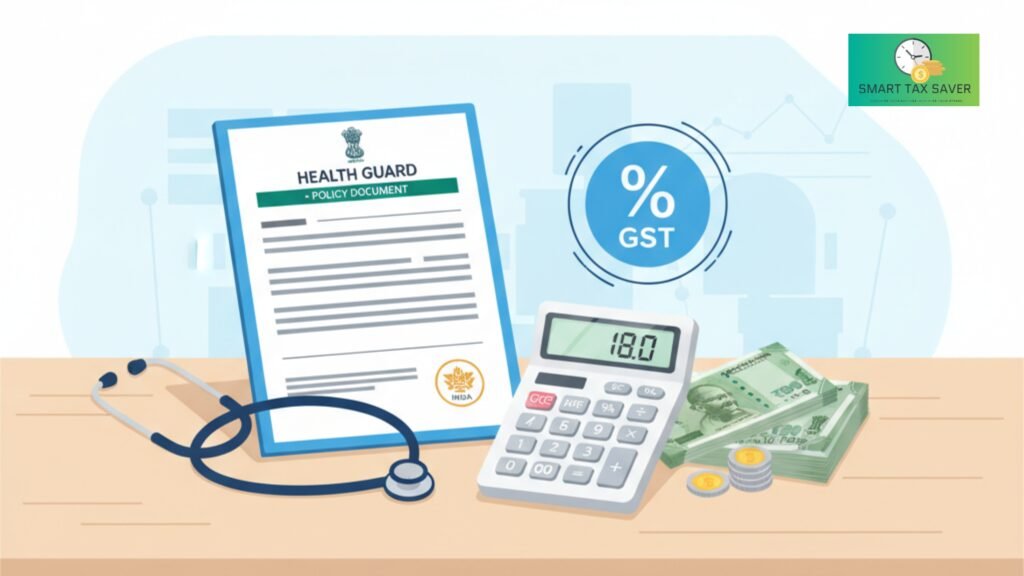Health insurance is one of the most important financial protections for any family today.
But many people are still confused about GST on health insurance—what it is, how much it costs, and how it affects your premium.
In this guide, you’ll learn everything about GST on health insurance, its rate, calculation, and the tax benefits you can still enjoy in 2025.
Table of Contents
GST on Health Insurance Explained

When you buy or renew a health insurance policy, an 18% Goods and Services Tax (GST) is added to your premium.
This is called GST on health insurance, and it applies to all policy types in India.
For example, if your basic premium is ₹10,000, then 18% GST means you’ll pay ₹1,800 extra, making your total ₹11,800.
It’s a standard tax rate that every insurance company applies to their policies.
Latest GST Rate on Health Insurance with Correct HSN Code
The latest GST rate on health insurance in 2025 is 18%.
This rate applies equally to individual, family, and senior citizen health plans.
The HSN (Harmonized System of Nomenclature) code for health insurance is 997133, which represents life and health insurance services.
This code helps identify the correct tax category for GST on health insurance across India.
Understanding the Types of GST on Health Insurance
There are three types of GST charged on insurance services:
- CGST (Central GST)—goes to the central government.
- SGST (State GST)—goes to the state government.
- IGST (Integrated GST)—used for interstate services.
If your insurer and your location are in the same state, GST on health insurance will be divided into 9% CGST and 9% SGST.
If your insurer is in another state, 18% IGST applies.
In both cases, the total GST for health insurance remains 18%.
Impact of GST on Health Insurance in India

Before GST, a 15% service tax was applied to insurance premiums.
Now, GST on health insurance is 18%, which slightly increases the total cost.
For example, if your annual premium was ₹10,000 earlier, you now pay ₹11,800.
Although this increase seems small, it adds up over time.
However, health insurance still offers major financial protection and tax savings, which outweigh the small rise in cost due to GST for health insurance.
Calculating GST on Health Insurance Explained in a Simple Way
Here’s how you can calculate GST on health insurance easily:
| Base Premium | GST at 18% | Total Payable |
|---|---|---|
| ₹10,000 | ₹1,800 | ₹11,800 |
| ₹15,000 | ₹2,700 | ₹17,700 |
| ₹25,000 | ₹4,500 | ₹29,500 |
To find your total cost, just add 18% GST to your base premium.
The good part is, even though you pay GST, you can still claim the entire amount (including GST) under Section 80D tax deductions.
Can I Claim Input Tax Credit (ITC) for GST on Employee Health Insurance Premiums?
For individuals, input tax credit (ITC) on GST on health insurance is not allowed.
However, for businesses, ITC can be claimed if group health insurance for employees is a legal or contractual requirement.
If it’s provided voluntarily, ITC on GST health insurance cannot be claimed.
Always consult your tax advisor before taking any credit or deduction related to GST.
Tax Benefits Under Section 80D
Even though GST on health insurance increases your premium slightly, you can still claim tax benefits.
Under Section 80D of the Income Tax Act:
- You can claim up to ₹25,000 for yourself, your spouse, and your children.
- You can claim up to ₹50,000 more for parents above 60 years of age.
The deduction applies to the total premium, including GST for health insurance.
FAQs on GST on Health Insurance
Q1. What is the GST rate on health insurance in 2025?
The GST rate on health insurance is 18%.
Q2. Can I avoid paying GST-charged health insurance?
No, GST is mandatory on all health insurance premiums.
Q3. Does GST apply to top-up and rider plans?
Yes, top-up plans and riders also include GST at 18%.
Q4. Can individuals claim ITC on GST for their health policy?
No, individuals cannot claim input tax credit on GST paid for personal health insurance.
Final Thoughts
GST for health insurance has made premiums slightly higher, but it has not reduced the importance of having coverage.
The protection and tax benefits you get from a good health policy are far greater than the extra tax you pay.
It’s a small price for long-term peace of mind and financial safety.
No, ITC is not available for individuals.



